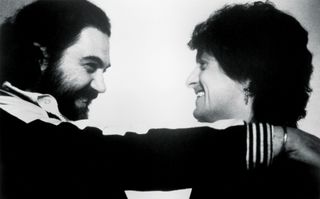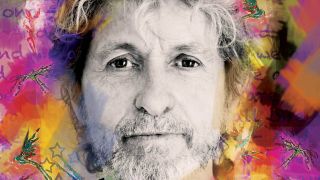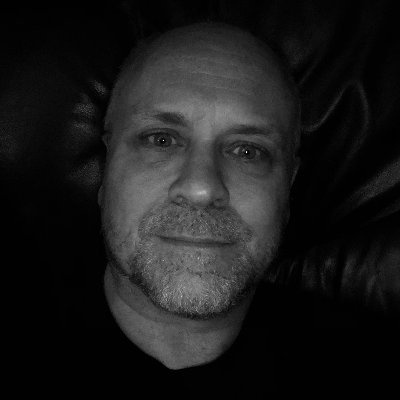The former Yes man reveals all about his upcoming album with Jean-Luc Ponty, tells us what he thinks of Yes today, and shares his thoughts on everything from Sibelius to strippers and spiritualism.
Tomorrow morning, and probably every morning when he’s not on tour, Jon Anderson will have breakfast in bed with his wife, Jane, at their house in the old Spanish mission town of San Luis Obispo, California. “And then we sit for a while and watch the birds, the deer and the rabbits outside the house,” he says.
Anderson’s sing-song voice is so familiar from those old Yes albums that when you ask where he lives in relation to Los Angeles, you half expect him to answer, "Close to the edge, down by the river…" (In fact, it’s a three and-a‑half-hour drive north of LA.)
It’s not a bad life, then, for the 70-year-old, Lancashire-born singer-songwriter and exiled Yes vocalist. However, there have been some not-so-good days. In 2008, Anderson suffered acute respiratory failure, which required months of recuperation and cost him his place in Yes, who continue to tour and record without him.
Today he brushes off a question about his health (“It’s good – I’m good”), preferring to look forward to his latest project, a collaboration with ex-Mahavishnu Orchestra violinist Jean-Luc Ponty.
But over the course of the conversation, Anderson ends up looking forwards, backwards, sideways, upside and down. Dig a little deeper, though, and this spiritually minded astral traveller isn’t so far removed from the teenager who started his musical career as a singing milkman in Accrington.
First, though, there’s Progeny – a just-released 14-disc boxed set that contains seven Yes shows from 1972 – to dissect. Or perhaps not…
Chris is going through it. It’s a tough one. I pray for him every day – I’m sending out that love energy.
Have you made it through all of Progeny yet?
No [laughing], because I haven’t had my copy yet! There’s a lifetime’s worth of music there. I still remember that time vividly. Yes were on cloud nine and we stayed that way for about a decade.
If pushed, that 1972 line-up was the classic Yes line-up, wasn’t it?
That’s classic Yes. If I think back to those shows, the band was in harmony, musically and mentally.
Have you spoken to Chris Squire since he was diagnosed with leukaemia?
I emailed him after I heard he got sick. Chris is a musical brother, regardless of anything else that’s gone on. I wouldn’t be where I was if it wasn’t for him. I was with Yes for 35 years – that’s half a lifetime. You don’t just forget that. But Chris is going through it. It’s a tough one. I pray for him every day – I’m sending out that love energy.
What stage is the Anderson Ponty Band album at now?
We’ve just finished it, and the DVD, and they’ll be out in September. We’re hoping to tour the UK in October. It’ll be me with Jean-Luc and his band. They’re formidable musicians and they don’t mess around.
How did this collaboration with Jean-Luc come about?
I found a couple of Jean-Luc’s songs from the 70s on his website and sent him one of his tracks with me singing on it. I said, “If we worked together, this is what it would sound like.” He liked it and we carried on from there. We went to Aspen [Colorado] for two and a half weeks and did a show, which became the basis for the album.
What material will you be playing?
It’s a mix. We do some Yes songs – Roundabout, And You And I and Owner Of A Lonely Heart. The band wanted to play Owner… and it sounds very cool with a violin. They play the hell out of it.
Let’s go back. Do you remember the first gig you ever played?
It was with my brother Tony’s group, The Warriors, and it was in Padiham’s Working Men’s Club [in Burnley, Lancashire, circa 1963]. We came on after the bingo but just before the stripper. I was a young lad – 17, maybe – and it freaked me out when this woman walked past us naked. It was enough to put you off sex forever…
She wasn’t good-looking?
No, she was frightening!
One of your early jobs was as a milkman.
Yes. My brother drove the milk van and I used to hang on the side, and we’d sing Everly Brothers songs together as we did the round. We were always singing. That was a very happy time. It was the beginning of rock’n’roll, Buddy and Elvis and skiffle. That was the beginning of everything.
Do you ever go back to Lancashire?
Only when I tour. I’ve lived in America for over 25 years and I have dual citizenship. That’s the nature of a musician’s life – or my life, anyway. It’s touring, recording, writing… I’m not on my yacht, having champagne. I never wanted to do that.
That’s an unusual attitude to have in this business. The Stones and The Who are touring America now and making millions so they can sit on their yachts…
I know, and it’s unbelievable. I remember writing a song about this: ‘Money come, money go, money high, money low…’ I think it’s on Tormato… [It’s an extra track on the 2004 reissue and also appears on the 1991 four-disc set Yesyears called Money – Ed.] Money is great, don’t get me wrong, but let’s not just live because of money.
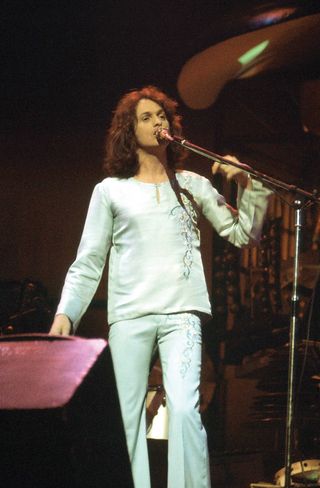
Photo above: Getty Images
Your attitude must have caused problems for managers and other band members over the years.
A couple of times, yes! There was a promoter who wanted to put Yes on a bill with another big band. I’m not going to say who the other band was, but we could have made so much money. But I wouldn’t do it. Yes needs two and a half hours to get going. You need to have the full Yes experience. The promoter was going crazy: “You gotta do it, Jon.” But the more he said that, the more I said, “I don’t think so.”
This seems to have been a trait in your career: not doing what’s expected of you.
That’s just me. But that was also Yes. There were not many bands that went off on tangents the way we did. It used to drive our old manager Brian Lane crazy when I’d say, “Hey, we’re gonna do four 20-minute pieces on stage tonight.” And he’d say, “Why, Jon? You could make millions if you wanted to…” But I’d say [loftily], “No, Brian, it’s all about the music.”
Let’s address a popular legend: the one about you having a wall of tiles built in Morgan Studio because you wanted your voice to sound like it did in the bathroom.
That’s true! It was when we were recording Tales From Topographic Oceans [in 1973]. I went into the bathroom, started singing and thought, “Wow!” I liked the way my voice sounded, and I worked out that it was because of the tiles. To begin with, I wanted to record …Topographic… in this beautiful bluebell wood in Berkshire. I wanted us to record in a tent and run the power from a generator, but I wanted the generator to be buried so you couldn’t hear it…
Presumably the rest of the band stopped you?
They just said [forcefully], “Jon! Stop that!” So I put up a lot of plants and cut-outs of cows, sheep and ducks in the studio instead. The general consensus was, “It’s just Jon being Jon.” Rick Wakeman said the greatest thing ever about me. He said, “Jon Anderson is the only guy I know trying to save this planet while living on another one.” I love that.
You and Rick always seemed like unlikely allies in Yes. You, the spiritually minded vegetarian; Rick, the beer-drinking carnivore…
I know. But our common ground is music. Rick’s a great musician. We still talk all the time.
You rejected the drink-and-drugs culture for a more spiritual lifestyle years ago. When you hear people discussing the benefits of, say, meditation now, do you feel vindicated?
Maybe. I already knew that meditation was good for you. But it was when I met someone [second wife, Jane] and fell in love that it really made me want to be healthier. It helps if you have someone with you that has a similar attitude to life.
Rick Wakeman said the greatest thing ever about me. He said, ‘Jon Anderson is the only guy I know trying to save this planet while living on another one.’
Is there any advice you can give a novice? I’ve tried meditating but I can’t switch off my brain.
It’s a breathing technique. Sit very quiet, have your mantra, and then all of a sudden, there you are. They should teach it in schools. Seriously. I meditate once or twice a day for 15, 20 minutes.
Earlier today I listened to your first solo album, 1976’s Olias Of Sunhillow, for the first time in over 30 years.
Good. I love it. I still do. I’m surprised, though, that it seems to have acquired its own thing, like a life of its own. There were a couple of guys here who wanted to reproduce the album. They actually did a performance of it [the UML Choral Union in Lowell, Massachusetts, in April 2013] with about 30 people. I’ve always thought that one day I should get that album orchestrated with a choir. That would be really crazy good.
You invented your own language on the track Ocean Song: ‘Do ga riytan, sha too Raytan, gan matta sha pa…’ No one could accuse you of chasing a hit single there.
Yes, but it was honest. I was making the music I wanted to make, and I’m still doing that.
You said that Yes were on “cloud nine” for most of the 70s. But after 1978’s Tormato, you’d had enough. Was it scary or liberating to quit the band and go solo?
It was a combination of scary and a relief. At that time, Yes was very divided. The record company wanted us to make more commercial music and become big pop stars. The more they said that, the more I said no. Rick felt the same. So we quit… Only I came back later [in 1983] with Owner Of A Lonely Heart.
Which was a good pop song.
Yes, but if you go into this business with the attitude of “OK, now I’m gonna have a hit record” – well, good luck, but you may as well go to Vegas and throw it all on 26.
The irony is that after leaving Yes the first time, you had three hit singles with Vangelis: I Hear You Now (1979), State Of Independence and I’ll Find My Way Home (1981).
Yeah, but by not trying to have hits. Working with Vangelis was the exact opposite of Yes. We walked into a studio, he played, I sang and that was it – done. We would probably do four songs in an hour. Everything was a first take.
How close did he come to joining Yes in 1974?
We rehearsed for a week, and it was the funniest thing. Let’s just say, it did not work out. But he stayed in London and we stayed in touch. He’s a beautiful man. I used to go to his studio to watch him create and it was like watching a magician. I remember he was doing the Blade Runner soundtrack. I listened to him doing this film score music for a few hours and then he’d stop and write a symphony. I think he wrote a symphony every other day.
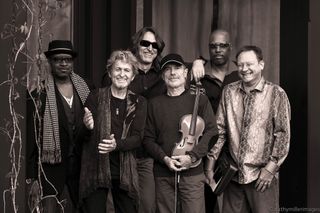
Photo above by Cathy Miller
You talk about honesty in music, but that must have cost you over the years.
Yes. I had a deal with Virgin [in 1981] to make an album about the great French artist Marc Chagall. I also had another piece I’d written about the fairy kingdom. I’d read this incredible book called A True Fairy Tale by Daphne Charters and wrote some music based on that.
What went wrong?
Virgin signed Phil Collins and his first solo album [Face Value] came out. Phil became a megastar and Virgin asked me for their money back [laughs].
Did you give it back to them?
I did, although I’d spent most of it on production costs. I’d been working with the wonderful jazz pianist Jacques Loussier at his studio in the south of France – Brad Pitt lives there now. I’d been there for six weeks making this incredible music. Then Virgin sent these two guys down – two punks – and they listened to it, and they didn’t like it one bit!
Will this music ever come out?
It will come out before I disappear into the ether. But the Chagall music was bootlegged and is on the internet. Someone got hold of a tape and put it out.
What’s your attitude towards downloading? Weren’t Yes albums meant to be heard as albums, not as individual tracks? Does it bother you that people aren’t listening like that anymore?
I don’t know [long pause]. I’ve always thought that music should be for everybody. I remember when the whole thing started with downloads and people talking about paying for this and not paying for that. I always thought music should be cheaper.
There aren’t a lot of musicians from your era who would agree with that.
Well, I always thought CDs should have been much cheaper. I used to say they should be two dollars each and in the bargain bin at Woolworths, so we could reach more people. [Starts laughing] Brian Lane used to go crazy: [in a schoolmasterly voice] “No, Jon, never ever say that! Don’t you ever dare say that!”
Presumably the internet has revolutionised the way in which you work as a songwriter.
Completely. Rick and I did an album called The Living Tree [in 2010]. At the time I was doing a lot of solo work. Rick used to send me the music. I’d sit in my hotel with a laptop, write some lyrics, sing them and then send them back. Right now I’m diving into different internet projects like crazy.
Which other artists are you currently working with, apart from Jean-Luc Ponty?
A brilliant guitar player from Chicago called Sean McKee. We’re writing some film music together. It’s a very surreal concept film about the truisms of magic. Sean’s a visual artist as well as a music-maker. He’s into this futuristic, 3D-without‑glasses system. Roine Stolte from The Flower Kings and I have been juggling ideas for a while. Right now I’m making music with people in Italy, Poland, Romania, France, Holland. I have this constant flow of working relationships.
There’s a lot of your artwork displayed on your website. Do you still paint?
Yes, I was painting a couple of days ago. We ran a Kickstarter campaign to raise money for this [Anderson Ponty] album. Some of the people who gave money wanted me to write out all the lyrics for Awaken, Starship Trooper and the whole of [second solo album] Song Of Seven. Re‑reading the lyrics to Song Of Seven blew my mind.
Why was that?
Having to write the lyrics out by hand, I realised there was a beautiful balance of words. I hadn’t thought about that album for over 30 years. But the lyrics still looked and sounded right.
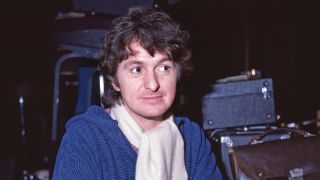
Are you very self-critical?
Oh yes. Of course. Sometimes you look back at things you did 20 or 30 years ago and say [in a Lancastrian accent]: “That were a load of crap. What was I thinking? What was I smoking?”
In the past, you’ve said that some of the best Yes albums are Fragile, 90125 and Talk. But if you could change anything about one of the other Yes albums, what would it be?
Oh, there’s always something on every album. Sometimes I hear them and think, “Oh my gosh, we should have mixed that differently.” I was always frustrated by The Gates Of Delirium [on 1974’s Relayer]. There’s a bit in there where we were trying to create the sound of a war, trying to raise the devil in man [laughs].
Is it true that you and drummer Alan White made those noises by banging various bits of scrap metal together?
Yes, we had all kinds of junk. We mic’d up one of those children’s toys – a slinky – and I jumped up and down on Alan’s old cymbals. It’s meant to represent the unearthly sound of chaos, but the mix never sounded great.
You’ve been writing songs for over 40 years. Are there any specific songwriters you admire?
When I hear Elton John’s songs on the radio or those old Stax records, I can’t believe how damn perfect they are. Randy Newman is another one – I marvel at his lyrics. There’s also that young guy with the big hair and the small guitar? Ed Sheeran. I don’t know if he’s English or American, but he’s writing a lot of stuff and it’s so beautiful.
Is it strange hearing Yes performing with another singer? They’ve had two in to replace you since 2008.
[Long pause] No, not really. You think, “OK, well, so that’s what they are now.” That’s not my idea of what Yes is. But what can I do?
They’ve always replaced you with soundalikes, though.
Well, they have to work with people who can make it sound as much like the real thing as possible [laughs]. Now, since Chris got sick, it’s just the two guys [guitarist Steve Howe and Alan White]. But I don’t blame them. They’ve got to make a living. I’ve been there myself – you get into your own little world and you don’t care about other people.
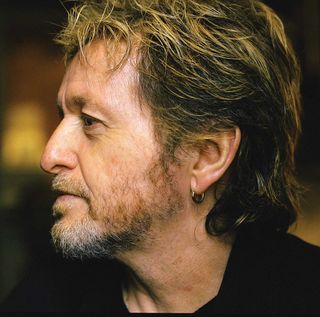
Photo above: Getty Images
Could you see yourself ever singing in Yes again?
Of course. Me and Rick have both said many times that we would love to get back with the guys… when they wake up. That’s our little joke. When I’m out there singing on my own, I still think I’m part of Yes. Those are my songs.
What’s an average day for Jon Anderson, then?
Get up, make breakfast in bed and then go to the studio and start creating. I work every day of the week, seven days a week. I’m always doing something… unless there’s football on, because I’ve got to watch Manchester United.
So it’s basically music, meditation and Man United then?
Yes, but I’ve also become a big Barcelona FC fan because of [Lionel] Messi – he’s on another level. They’re playing this Saturday against Juventus. That’s going to be a big moment. [Barcelona won the game, the Champions League final, 3-1.]
You were 70 last year, but celebrating it this year. How?
To celebrate, my wife is taking me to Finland this year for my favourite composer Sibelius’ 150th-anniversary week. They’ll be playing all of his symphonies. Sibelius’ music is deep earth music that has a real connection for me.
Finally, do you have any last words to share?
I’ve been writing a memoir and if it ever comes out, I’ll call it Music Is Easy, The Business Is Not. That title sums it up. But I haven’t finished writing it. Why? Because I’m not dead yet.
This article originally appeared in Prog issue 57.
Photo below: Getty Images
